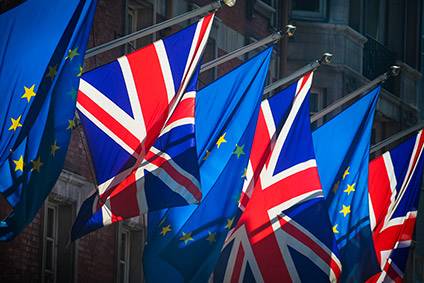
Local authorities in the UK should prepare Brexit food plans, an organisation made up of specialist academics and environmental health specialists has said.
Food Research Collaboration, which has members including the Chartered Institute of Environmental Health, City, University of London and the University of Sussex, has written to every local authority in the UK urging them to set up ‘food resilience teams’ to cope with possible disruption in the food supply chain when the country leaves the European Union on 29 March.

Discover B2B Marketing That Performs
Combine business intelligence and editorial excellence to reach engaged professionals across 36 leading media platforms.
“Supermarket food will be affected by Brexit on all levels, regardless of the outcome of the Parliamentary vote on the Draft Withdrawal Agreement,” it said.
“As the date for leaving the EU approaches, preparations to ensure we have a safe, adequate and sustainable food supply need to start urgently. Local authorities (LAs) have a vital part to play in these preparations, but government has so far neglected to provide guidance.”
The group points out that LA’s responsibilities include the enforcement of food safety and standards regulation, the control of imported food at ports and airports and the certification of foods for export.
“This briefing aims to help local authorities prepare for food Brexit. It shows why LAs should prepare food Brexit plans, and outlines five courses of action they could consider,” it said.

US Tariffs are shifting - will you react or anticipate?
Don’t let policy changes catch you off guard. Stay proactive with real-time data and expert analysis.
By GlobalDataThe briefing recommends local authorities create food resilience teams, anticipate and reduce the impact of food Brexit, particularly on SMEs [small- and medium-sized businesses], narrow the information gap and treat the public openly and fairly, prepare for public engagement and be a local food voice so that central government knows the local realities.
Its alert comes after a number of companies – most notably Premier Foods and Nestle – have openly talked about stockpiling ingredients or finished products ahead of Brexit.
Mars is the latest food company to admit to taking such an approach.
Quoted in The Belfast Telegraph newspaper, the company’s global food and drink president, Fiona Dawson, said Mars will begin stockpiling foods in both Ireland and the UK as part of its contingency plans for a so-called hard Brexit – the UK leaving the EU without a trade deal.
“We’ll obviously look at increasing our stocks because there will be a period of uncertainty for people relating to whatever deal is put in place. We’ll be stockpiling both in Ireland and the UK,” she said.





